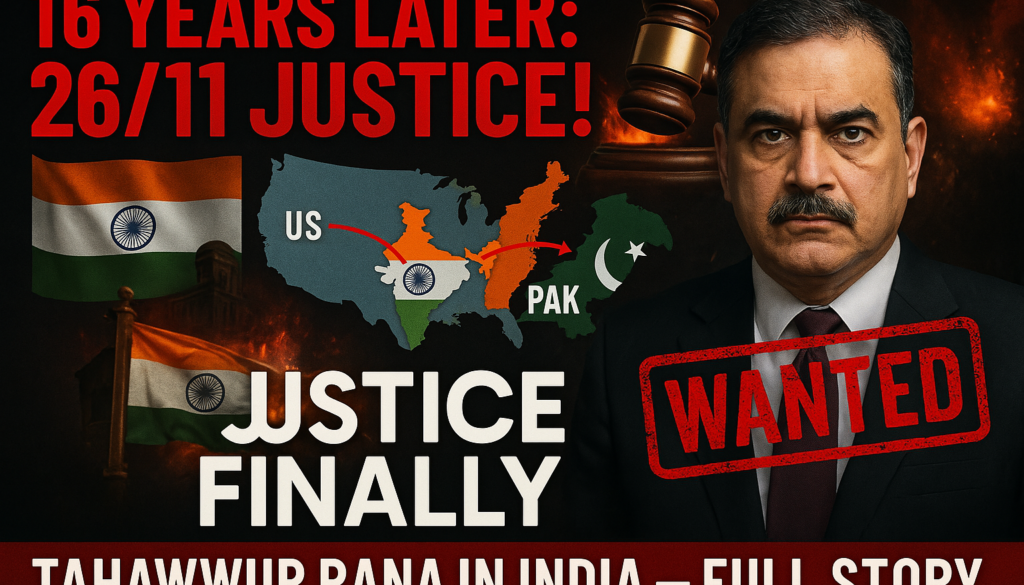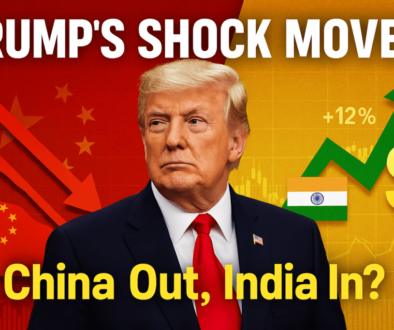India’s 16-Year Wait Ends: 26/11 Conspirator Tahawwur Rana Flown to Delhi, Will Face Trials
Introduction: A Historic Moment for Justice
Hello friends, I am Harsh, and today we are witnessing a landmark event in India’s fight against terrorism. After a grueling 16-year wait, Tahawwur Hussain Rana, the Canadian-Pakistani terrorist accused of masterminding the 26/11 Mumbai terrorist attacks, has finally been extradited to India. This development, which has drawn reactions from Israel, Pakistan, and the United States, marks a pivotal moment as Rana will now face a trial in an Indian court. The legal process will mirror the one followed in the case of Ajmal Kasab, the lone surviving attacker of the 2008 attacks, ensuring that Rana receives proper legal representation and a fair hearing under Indian law.
The 26/11 attacks, which claimed 166 lives, including 141 Indians, six Americans, and four Israelis, remain one of the darkest chapters in India’s history. Bringing Rana to justice is not just a legal victory but also a symbol of India’s unwavering commitment to holding terrorists accountable, no matter how long it takes.
ALSO READ : The Shocking Saga of an American YouTuber’s Mikhailo Polikoff Reckless Journey to North Sentinel Island
The Long Road to Justice: From 2008 to 2025
To understand the significance of this moment, let’s delve into the timeline of events since the 26/11 attacks on November 26, 2008. The attacks, executed by Lashkar-e-Taiba with support from Pakistan-based handlers, targeted iconic locations in Mumbai, such as the Taj Mahal Palace Hotel, Oberoi Trident, and Nariman House. The brutality of the attacks, which lasted for four days, left the nation in shock and mourning, with over 300 people injured alongside the fatalities.
Initial Investigations and Global Challenges

Initial investigations by India’s National Investigation Agency (NIA) and other agencies pointed to a network of conspirators operating from Pakistan and beyond. Tahawwur Rana, a former Pakistani military doctor who later became a Canadian citizen, emerged as a key figure. Evidence suggested that Rana provided logistical support, financial aid, and a cover for the attackers, making him a central figure in the conspiracy. However, unlike other suspects who were arrested or killed, Rana was in the U.S., complicating India’s efforts to bring him to justice.
In 2011, the U.S. District Court in Chicago tried Rana on charges related to terrorism but controversially ruled that he had no direct involvement in the Mumbai attacks. This decision sparked outrage in India, with then-Gujarat Chief Minister Narendra Modi, now India’s Prime Minister, publicly criticizing the ruling as a miscarriage of justice. Modi argued that the evidence against Rana—phone records, financial transactions, and witness testimonies—was substantial enough to warrant a stronger prosecution.
ALSO READ : Donald Trump’s 125% Tariff Shocks China: A Deep Dive into Global Trade, Markets, and Opportunities for India
Diplomatic Struggles and International Pressure
For years, India engaged in intense diplomatic negotiations with the U.S., pressing for Rana’s extradition. These efforts were met with resistance due to Rana’s dual citizenship (Canadian and Pakistani) and his ties to the Pakistani military, where he served in the Pakistan Medical Corps before allegedly joining Lashkar-e-Taiba. The U.S. also faced pressure from Pakistan and Canada, both of which had geopolitical stakes in the case. During Barack Obama’s presidency, U.S. policies often appeared to favor Pakistan, leading to frustration among Indian officials and citizens who felt that justice was being delayed.
Over time, India compiled a dossier of evidence, including intercepted communications, bank records, and testimonies from co-conspirators like David Headley, another key figure in the 26/11 plot who is currently serving a prison sentence in the U.S. Despite this, progress was slow until recent years, when shifting global alliances and a stronger India-U.S. partnership under Prime Minister Modi and U.S. President Donald Trump changed the dynamics.
Global Reactions: What Israel, Pakistan, and the U.S. Are Saying
The extradition of Tahawwur Rana has triggered a range of responses from key international players, each with its own interests and concerns.
United States: A New Era of Cooperation
The U.S. has issued an unusually supportive statement, acknowledging the global outrage over the 26/11 attacks and endorsing India’s efforts to deliver justice. U.S. officials have emphasized that Rana’s extradition aligns with their commitment to combating international terrorism. During Prime Minister Modi’s visits to the U.S., President Trump categorically assured that Rana would be extradited “as soon as possible,” signaling a shift in U.S. policy toward prioritizing India’s security concerns over Pakistan’s objections.
However, the U.S.’s relationship with Pakistan remains complex. Despite cutting aid in other areas, the U.S. continues to provide millions of dollars in military assistance, such as funding for Pakistan’s F-16 jets, which has raised eyebrows globally. Experts suggest that this duality reflects strategic interests in South Asia, where Pakistan is seen as a counterbalance to other regional powers, even as it harbors terrorist networks.
ASLO READ : Trump 50% Tariff on China 2025: Impact & Risks Explained
Pakistan’s Denial and Nervousness
Pakistan’s response has been predictably evasive. Despite Rana’s documented ties to the Pakistani military and Lashkar-e-Taiba, Pakistan has publicly distanced itself, claiming that Rana is a Canadian citizen and that any inquiries should be directed to Canada. This stance is widely seen as an attempt to avoid scrutiny, especially if Rana’s interrogation reveals Pakistan’s role in funding, training, or supporting the 26/11 attacks.
Security analysts believe that Pakistan is particularly nervous about the NIA’s 20-day custody request. If Rana provides detailed testimony about Pakistani state actors or military officials, it could lead to international sanctions, diplomatic isolation, or renewed accusations of state-sponsored terrorism. Pakistan’s history of denying involvement in such attacks, despite overwhelming evidence, only heightens the stakes.
Israel’s Support and Strategic Interest
Israel, which lost four citizens in the 26/11 attacks, has been vocal in its support for India’s efforts. The Israeli government, possibly in coordination with its intelligence agency Mossad, has a vested interest in ensuring that all perpetrators are brought to justice. In a formal statement, Israel thanked India for its “persistence and determination” in pursuing Rana, noting that the attacks not only targeted Indians but also foreigners, including Israelis and Americans.
The Israeli connection is significant because the Chabad House in Mumbai, a Jewish community center, was one of the primary targets during the attacks. This has led some experts to speculate that Mossad may have provided intelligence or support to India during the extradition process, given Israel’s own experience fighting terrorism and its strategic partnership with India.
What Happens Next? The Trial and Its Implications
Tahawwur Rana’s trial in India will be closely watched by the international community. The NIA, which has been investigating the 26/11 attacks for over a decade, plans to use Rana’s interrogation to uncover new leads, potentially exposing deeper networks and state-sponsored involvement. The agency has evidence, including phone intercepts, financial trails, and testimonies from other convicts, that position Rana as a key facilitator, if not the mastermind, of the attacks.
Legal Process and Public Expectations
Under Indian law, Rana will be provided legal counsel and a fair trial, adhering to the same standards as in the Kasab case. However, public expectations are high, with many demanding the death penalty if Rana is found guilty. Legal experts caution that the trial could take years, given the complexity of the case and the need to cross-examine international witnesses and evidence.
The outcome of this trial could set a precedent for future extraditions and international cooperation against terrorism. It also provides an opportunity for India to showcase its judicial system’s capability to handle high-profile terrorism cases with transparency and efficiency.
ALSO READ : Global Trade War Ignites – China’s 34% Tariff on U.S. Sparks Chaos!
Geopolitical Ramifications
The trial’s implications extend beyond India. If Rana implicates Pakistan, it could strain already tense India-Pakistan relations and prompt global calls for action against Pakistan-based terrorist groups. For the U.S. and Israel, the case reinforces the importance of aligning with India in the fight against terrorism, potentially strengthening trilateral cooperation.
Conclusion: A New Chapter in the Fight Against Terrorism
This is a historic moment for India, as justice for the 26/11 attacks inches closer. We’ll keep you updated on Rana’s trial and its global impact.




